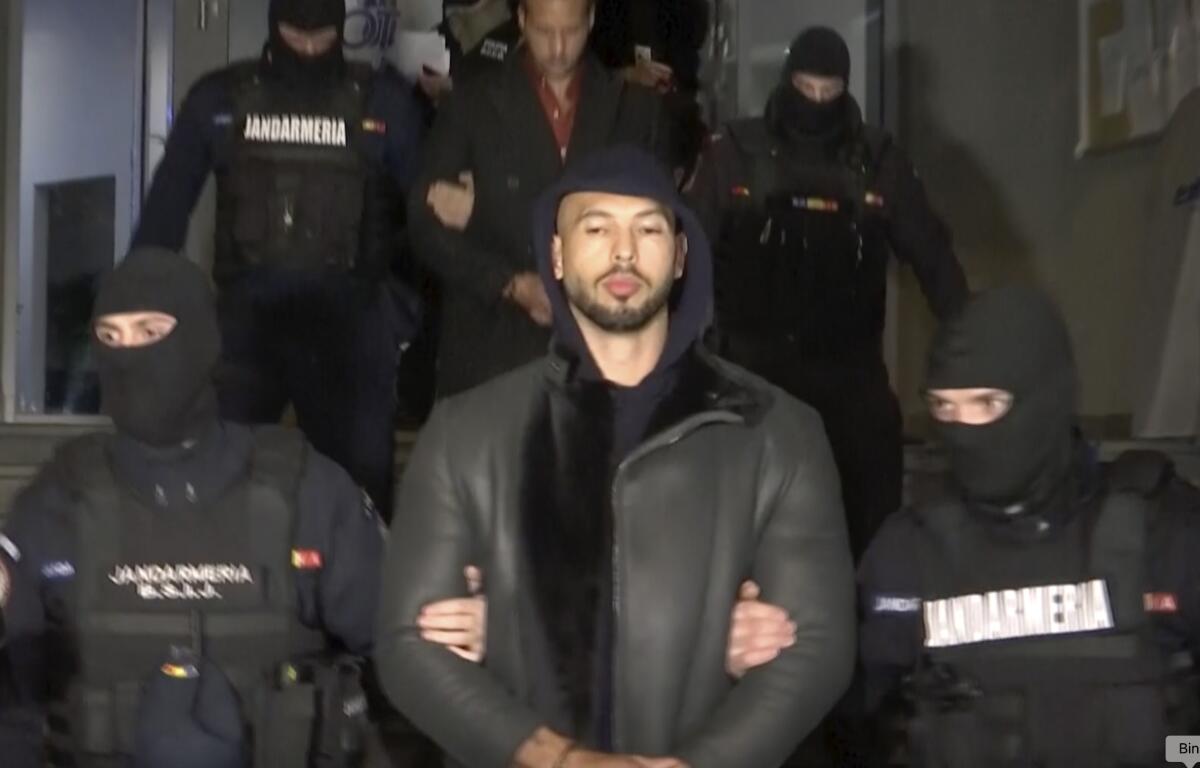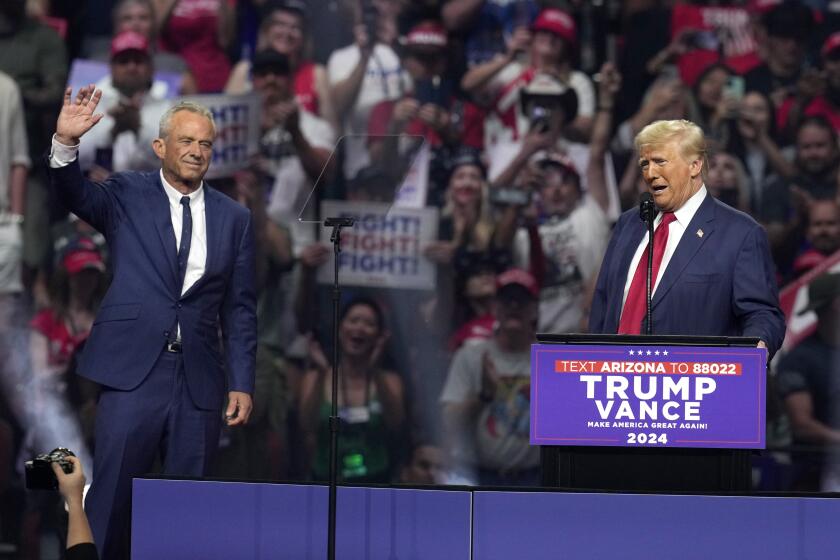Op-Ed: Why misogynists like Andrew Tate are going mainstream

Before Andrew Tate was arrested by Romanian authorities on charges of human trafficking, he was operating another problematic business: peddling toxic masculinity to his legion of fans, followers and customers.
For years now, Tate has been holding court with insecure men on social media platforms, promising them strength in return for a price. In disturbing videos and performances on YouTube and TikTok, he lectures them on how to mistreat women while creating an aura of “masculine dominance.” And, unnervingly enough, it’s been incredibly lucrative.
Tate isn’t alone. In recent years, toxic masculinity has become a booming industry filled with ridiculous figures and equally ridiculous assurances. There’s virtually no end to the muscle-bound characters promising lonely marks they’ll get bigger, stronger and find themselves swimming in women if they’ll only eat raw organs, follow exhausting regimens of physical and mental endurance and, most importantly, if they’ll hand over their credit card information and sign up for annual shipments of supplements and assorted products.
This kingdom of grift and ugliness didn’t appear out of nowhere. The ideas that define it gained traction with the rise of Gamergate, a subculture uprising targeting women in the video game industry, and metastasized into the Make America Great Again movement with Donald Trump’s 2016 presidential campaign.
Since then, it has served as reactionary backlash to #MeToo and matured into something of a multilevel marketing ecosystem replete with major players like Tate and networks of downstream characters and wannabe influencers.
Influencer Andrew Tate was arrested in Romania on suspicion of human trafficking. But don’t blame Greta Thunberg or that pizza box for his apprehension.
The worldview is problematic by itself. As a response to #MeToo and multiculturalism, it promotes aggressive misogyny as the default ideology. Blame for the problems of the world, both real and imagined, is placed on changing gender norms and female and LGBTQ empowerment.
Customers are reassured that they are the true victims. These changing norms are, after all, a massive attack on men as the rightful rulers and patriarchs of society, and only by purchasing products and swearing fealty to the so-called alpha males at the top of the marketing pyramid can adherents discover the “truth” behind what is sold as an immense conspiracy.
Considering the core beliefs of this worldview, it shouldn’t come as a surprise that this subculture lends itself to worsening right-wing radicalization. An emphasis on male aggrievement and the subject as the target of a grand, generational-defining conspiracy lends itself to reactionary movements.
Major figures in this industry cash checks while adjacent personalities and groups use the appeals to further conspiracy theories like so-called “White Replacement” and other antisemitic lies. Men, they repeat over and over, are the protectors of civilization, and shadowy cabals are constantly attempting to undermine their power in an effort to destroy all that is good and holy in the world. The answer, they continue to repeat, is to oppose liberal democracy and embrace authoritarian figures who perform the same faux-masculinity, like Trump, Jair Bolsonaro and Vladimir Putin.
We have seen this before, and it is worrying that this trend follows the same beats as previous cycles. In times of suffering and widespread aimlessness, authoritarian movements have predictably appealed to frustrated white young men with promises of glory and power while scapegoating tolerance, progress and “moral degeneracy.”
The solutions are always the same: A war-like stance against the conspirators and a “rebirth” of tradition and the patriarchal hierarchy.
Not surprisingly, these men are not fond of the treatment they feel so comfortable weaponizing against others.
What is being sold to these men are merely consumer identities, but over time they give way to ideology and purpose. We have to look no further than the American firearms industry, which has capitalized on masculine insecurity for decades by playing on men’s fear that they might not be able to protect their families, creating a poisonous culture marked by the threat of mass shootings and even armed insurrection.
Just a cursory glance at the internet sites and forums that led to Gamergate reveals a cesspool that eventually birthed domestic terrorists who shot up public spaces in the name of fighting against “domestic invasion” by immigrants.
It is very tempting to gawk at these grifters and laugh at their grandstanding and, as was the case with Tate, their eventual downfall. But these trends are symptoms of something larger, something incredibly insidious. Toxic masculinity has always represented a threat, but its growth as a concentrated, ideological marketplace is a worrying development. It tells us that conditions are worsening, and history tells us that we must address the problem before it spirals out of control.
Jared Yates Sexton is a writer and the author of “The Man They Wanted Me to Be: Toxic Masculinity and a Crisis of Our Own Making.” He is also the co-host of the Muckrake Podcast.
More to Read
A cure for the common opinion
Get thought-provoking perspectives with our weekly newsletter.
You may occasionally receive promotional content from the Los Angeles Times.












